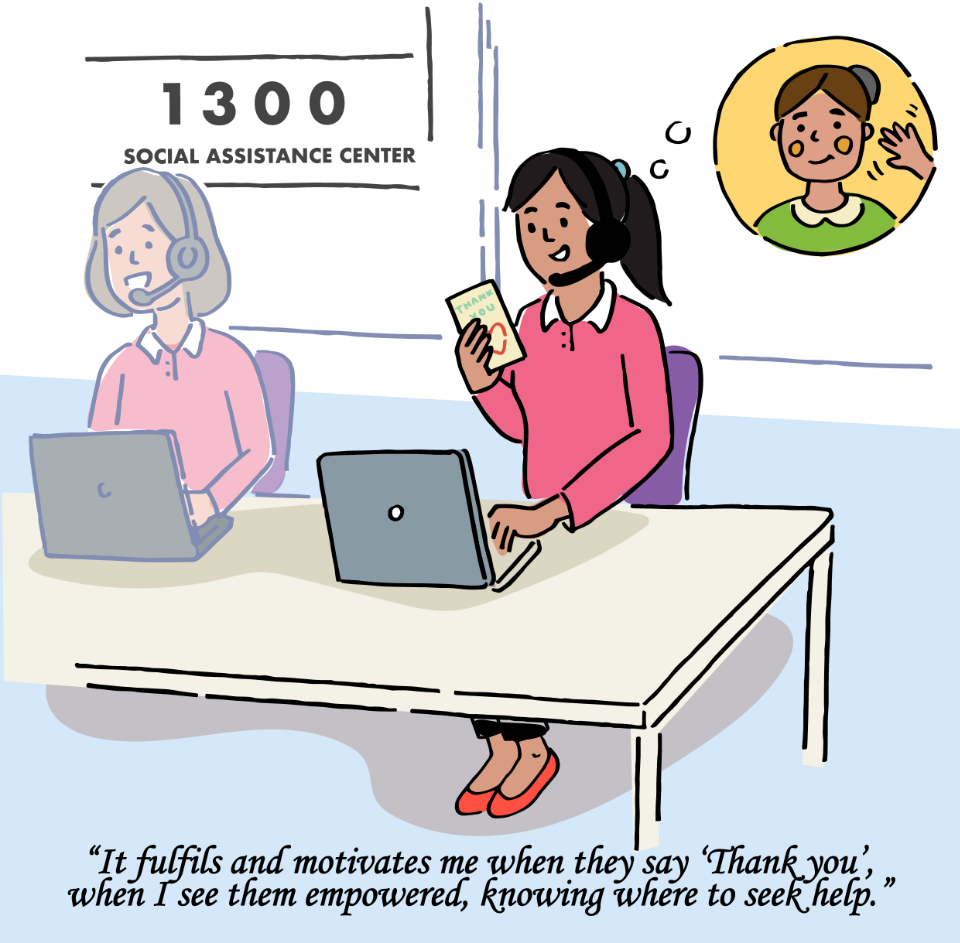“It fulfils and motivates me when they say ‘Thank you’, when I see them empowered, knowing where to seek help.”
Interview with Naiyapak Chaipan, Social Worker and Hotline Supervisor, 1300 Hotline, Social Assistance Centre, ThailandDate:

Established under the Ministry of Social Development and Human Security of Thailand, the 1300 Hotline, works on the frontline to respond to social issues, including violence against women, 24 hours a day. It receives reports on cases of socio-economic distress, then coordinates with the organizations or units concerned, notably the Department of Social Development and Welfare in Bangkok, and the Provincial Office of MSDHS in other provinces, among others. The hotline coordinates in directing the witnesses and survivors of violence to appropriate services including medical treatments, legal services and other forms of assistance. 1300 provides emotional support to women migrant workers survivors of violence and refer cases to specialized service providers (health, psychosocial, police, justice). Interpreters in English, Burmese and Khmer are available for women migrant workers not speaking Thai.
Naiyapak: Five years of experience at the 1300 Hotline have been nothing like the past months. Our work has doubled as travel restrictions and lockdown have left many women in socio-economic distress. Many women are with their abusers at home. Just like for many others, the increased workload is a challenge. With the increased number of calls and our limited capacity, I started to see that many of our hotline operators began to show signs of stress and burnout. We listen to hundreds of sensitive cases every day. Stress builds up over time, and it is important that we identify it. Frontline workers, too, need to rest. We introduced art therapy to our department to help each other explore our emotions, develop self-awareness and cope with stress. I find that it is really useful for us.
The 1300 Hotline operates 24/7. During the pandemic, I can barely put down my headset as there are incoming calls constantly every day, but I always aim to answer every call. We never know what would happen to the caller if we delay answering the phone or let the call slip.
Like in many other countries, our 1300 Hotline has become an even more important platform to provide information and refer callers to the support services they need. I am part of the team of hotline operators and social workers. Together, we receive more than 300 calls each day, it’s a 34 per cent increase compared to the same period last year.
For some women survivors of violence, reporting the incident is not easy. Among many calls, we also receive calls from women migrant workers. Many of them face language barriers. Many don’t know their rights, or where to seek help.
In my everyday work, I have another challenge. As a transgender person, many callers are not confident that I am able to help them. Some of them even told me that I needed help, too, to “fix” my gender as I am a transgender. But when I prove to them that I am able to help, regardless of my gender, they call me and thank me. It fulfils and motivates me when they say “Thank you”, when I see them empowered, knowing where to seek help. It gives me the strength to continue my job.
What I love about my job is my team. We respect each other and everyone can be themselves as who they are. I believe that when we can fully be ourselves, we perform better.
Within the team, we share the same goal – the callers are the priority, and they should get the help they need it.
COVID-19 is a challenge for us. We need to update ourselves with new knowledge and skills to cope with the situation. We are used to being the ones who help others, but often frontline workers struggle with asking for help themselves. I would like to remind my fellow colleagues and frontline workers who are providing assistance to people during times of hardship and a large-scale crisis like the COVID-19 pandemic: don’t be afraid to ask for emotional support.
The 1300 Hotline is working with the Safe and Fair Programme to ensure respectful and sensitive responses to calls from survivors of violence, including women migrant workers, are provided and referrals of cases are made to relevant essential services. We are thankful to the Safe and Fair Programme for conducting a workshop for the 1300 Hotline in the midst of the pandemic to exchange knowledge and experience of handling cases of violence, especially for our new team members who joined us during the COVID-19 crisis. This came right on time.
The ILO-UN Women programme “Safe and Fair: Realizing women migrant workers’ rights and opportunities in the ASEAN region”, under the global EU-UN Spotlight Initiative to eliminate violence against women and girls, supports front-line service providers to ensure essential services are available for women migrant workers who are subject to violence. More: www.spotlightinitiative.org/safe-and-fair
If you or someone you know has experienced violence against women in Thailand, contact 1300 Hotline for support no matter your migration status. Hotline: 1300
More contacts of service providers are available in the Service Directory for Women Migrant Workers in the ASEAN region: https://bit.ly/services4wmw
Interviewed by Pichit Phromkade
Written by Pichit Phromkade
Edited by Gihan Hassanein